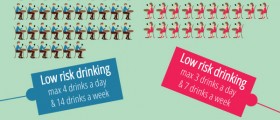
Alcohol Dependence
Alcoholism or alcohol dependence is a chronic disease characterized by physical addiction to alcohol. This addictive disorder is caused by continuous, excess intake of alcohol. Alcoholism can be devastating for both sufferers and their families. It can be quite difficult to overcome the addiction but there are many treatment options available to help in dealing with the problem. In this article we will provide information on different types of treatment for alcoholism.
Treatment Approaches for AlcoholismAlcohol dependence is a widespread disease and according to recent researches there are about 14 million Americans with this disease. For that reason, there are residential treatment facilities available in most areas to offer alcohol rehabilitation. Alcohol rehab involves several different stages designed to help alcoholics to recover and remain abstinent.
Priority in treating alcoholism is to help the alcoholic to overcome the physical dependency on alcohol. This is the most difficult phase for majority of alcohol addicts. This phase of treatment requires dramatic change to take place in the addict’s body. This is called detoxification and involves elimination of all of the alcohol from the system. Detoxification takes up to seven days, depending on the severity of the disease. It is accompanied with withdrawal symptoms that have to be carefully monitored and if needed treated with medications.
After completing this supervised withdrawal, the alcoholic moves to the second stage of treatment in which he has to deal with mental and psychological aspect of the addiction. At that point, the patient undergoes different psychological and physical tests to help the doctors or therapists determine the correct further course of treatment. These tests will determine whether the addicted will receive inpatient or outpatient therapy.
Inpatient programs are conducted in residential facilities. They are designed to offer help to individuals who have struggled with alcohol addiction for a long time and need to be constantly monitored in order to prevent a relapse of alcohol drinking.
On the other hand, individuals who are not severely affected by alcoholism but need help in recovering from the addiction, can attend the rehabilitation program in the outpatient facilities. The alcoholics must regularly go to different healing sessions and attend meetings at alcoholism support groups.
Counseling and therapy supports recovery from psychological aspect of the addiction and help to manage relapses. This involves cognitive-behavioral therapy that teaches alcoholics to cope with everyday circumstances, control behavior and stay away from alcohol.
There are different alcoholism support groups among which Alcoholics Anonymous is the best known. The support groups gather people with the same problem who share their experiences. These communities can offer tremendous emotional help and strength in recovering from alcoholism.
















Your thoughts on this
Loading...